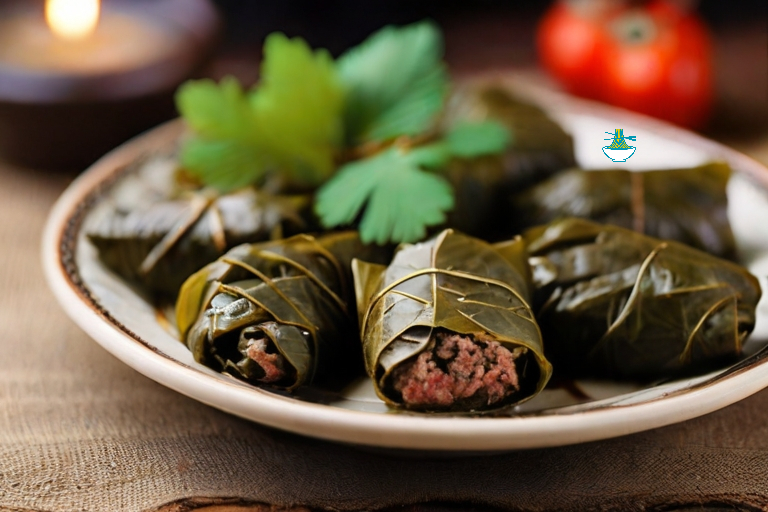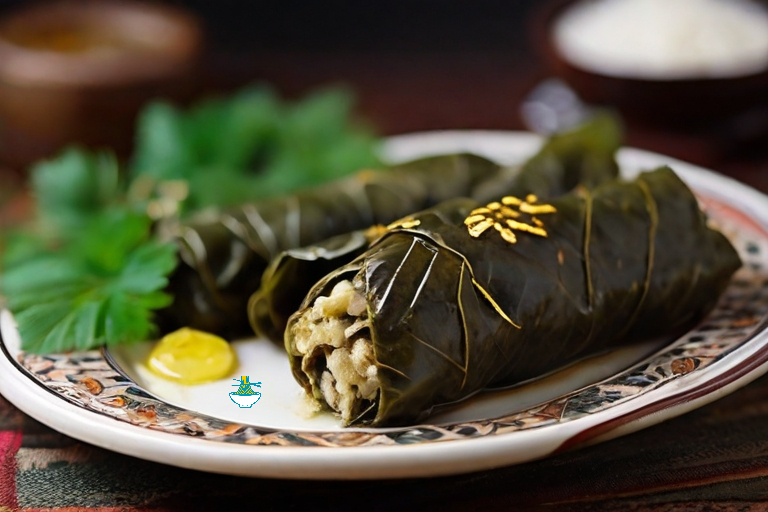Embark on a culinary adventure to the heart of Bosnia, where the rich tapestry of flavors and cultural heritage come together in a dish that epitomizes tradition and taste – Japrak. This beloved Bosnian delicacy encapsulates the essence of Balkan cuisine, offering a symphony of savory notes wrapped in vine leaves. Join us as we explore the art of crafting Japrak, a dish that has stood the test of time, carrying with it the stories and flavors of generations past. Get ready to discover the magic of Bosnian gastronomy as we delve into the preparation of this timeless masterpiece.
Ingredients:
- 1 jar of grape leaves (about 60 leaves)
- 1 cup long-grain rice, rinsed
- 500g ground beef or lamb
- 1 large onion, finely chopped
- 3 cloves garlic, minced
- 1/4 cup fresh parsley, chopped
- 1/4 cup fresh dill, chopped
- 1 teaspoon ground black pepper
- 1 teaspoon paprika
- 1 teaspoon salt (adjust to taste)
- 1/2 teaspoon cinnamon
- 1/2 teaspoon allspice
- 1/4 cup olive oil
- 1 lemon, sliced (for garnish)
- Yogurt or sour cream (for serving)

Instructions:
Prepare the Grape Leaves:
1-Rinse the grape leaves thoroughly under cold water to remove excess brine.
2-Carefully separate the leaves, ensuring they remain intact. Trim any stems.
Prepare the Filling:
1-In a large mixing bowl, combine the rinsed rice, ground meat, chopped onion, minced garlic, parsley, dill, black pepper, paprika, salt, cinnamon, and allspice.
2-Mix the ingredients thoroughly until well combined.
Assemble the Japrak:
1-Lay a grape leaf flat on a clean surface, shiny side down.
2-Place a small amount of the meat and rice mixture (about a tablespoon) in the center of the leaf.
3-Fold the sides of the leaf over the filling, then roll it up tightly from the bottom to form a compact roll.
Arrange in the Cooking Pot:
1-Drizzle olive oil on the bottom of a large cooking pot.
2-Place a few unused grape leaves on the bottom to prevent sticking.
3-Arrange the rolled grape leaves snugly in layers, seam side down.
Cook the Japrak:
1-Pour enough water into the pot to cover the grape leaves.
2-Place a heavy plate or lid on top of the Japrak to prevent them from unraveling during cooking.
3-Bring to a boil, then reduce the heat to low, cover, and simmer for about 45-50 minutes or until the rice is cooked and the grape leaves are tender.
Serve:
1-Carefully remove the Japrak from the pot and arrange them on a serving platter.
2-Garnish with lemon slices.
3-Serve hot with a side of yogurt or sour cream.
Enjoy:Delight in the flavors of Bosnian cuisine as you savor the deliciously tender and aromatic Bosnian Japrak. This dish is perfect for sharing with family and friends, bringing the warmth of tradition to your table.
Nutritional Values
Nutritional values can vary based on specific brands and preparation methods, but here's a general overview of the approximate nutritional values for the listed ingredients:
Grape Leaves (60 leaves):
- Calories: 15 per leaf
- Carbohydrates: 4g per leaf
- Fiber: 1g per leaf
- Protein: 0.5g per leaf
benefits: Rich in antioxidants and fiber, grape leaves may aid digestion and contribute to heart health.
Long-Grain Rice (1 cup, cooked):
- Calories: 205
- Carbohydrates: 45g
- Fiber: 0.6g
- Protein: 4.3g
benefits: A good source of energy and contains essential nutrients like vitamins and minerals, contributing to overall health.
Ground Beef or Lamb (500g):
- Calories: 1100 (for lean ground beef)
- Protein: 95g
- Total Fat: 75g
- Saturated Fat: 29g
- Cholesterol: 400mg
benefits: High-quality protein source, rich in essential amino acids, iron, and zinc for muscle health and immune support.
Onion (1 large):
- Calories: 60
- Carbohydrates: 14g
- Fiber: 3g
- Protein: 2g
benefits: Packed with antioxidants and anti-inflammatory properties, onions may support heart health and boost the immune system.
Garlic (3 cloves):
- Calories: 13
- Carbohydrates: 3g
- Fiber: 0.2g
- Protein: 0.6g
benefits: Known for its immune-boosting properties, garlic also has potential cardiovascular benefits and may help regulate blood pressure.
Fresh Parsley (1/4 cup, chopped):
- Calories: 4
- Carbohydrates: 1g
- Fiber: 0.3g
- Protein: 0.2g
benefits: A nutrient-dense herb, parsley is a good source of vitamins K, C, and A, and may have anti-inflammatory properties.
Fresh Dill (1/4 cup, chopped):
- Calories: 4
- Carbohydrates: 0.7g
- Fiber: 0.5g
- Protein: 0.3g
benefits: Contains antioxidants and may have anti-bacterial properties, contributing to overall immune system support.
Ground Black Pepper (1 teaspoon):
- Calories: 6
- Carbohydrates: 1.5g
- Fiber: 0.6g
- Protein: 0.3g
benefits: Black pepper may enhance nutrient absorption, particularly of certain vitamins and minerals, and has potential anti-inflammatory effects.
Paprika (1 teaspoon):
- Calories: 6
- Carbohydrates: 1.4g
- Fiber: 0.9g
- Protein: 0.3g
benefits: Rich in antioxidants, paprika may have anti-inflammatory properties and contribute to heart health.
Salt (1 teaspoon):
- Calories: 0
- Sodium: Approximately 2300mg (daily recommended intake should be considered)
benefits: While needed in moderation for bodily functions, excessive salt intake should be avoided to maintain proper fluid balance and prevent high blood pressure.
Cinnamon (1/2 teaspoon):
- Calories: 3
- Carbohydrates: 1g
- Fiber: 0.6g
- Protein: 0.1g
benefits: Contains antioxidants and has potential anti-inflammatory effects; cinnamon may also help regulate blood sugar levels.
Allspice (1/2 teaspoon):
- Calories: 3
- Carbohydrates: 0.8g
- Fiber: 0.5g
- Protein: 0.1g
benefits: Rich in antioxidants, allspice may have anti-inflammatory and digestive benefits.
Olive Oil (1/4 cup):
- Calories: 477
- Total Fat: 54g
- Saturated Fat: 7.7g
- Monounsaturated Fat: 37g
- Polyunsaturated Fat: 4.3g
benefits: A source of heart-healthy monounsaturated fats and antioxidants, olive oil may contribute to cardiovascular health and overall well-being.
Lemon (1, sliced):
- Calories: 4
- Carbohydrates: 2g
- Fiber: 0.6g
- Vitamin C: 18mg
benefits: Packed with vitamin C and antioxidants, lemons may support immune function and contribute to skin health.
Yogurt or Sour Cream (for serving):
- Nutritional values depend on the specific product, so it's advisable to check the packaging for accurate information.
benefits: Provides probiotics for gut health, along with calcium and protein, supporting bone health and digestion.
Keep in mind that these values are estimates and may vary based on factors like the specific brands used and cooking methods. Adjustments can be made based on dietary preferences and nutritional needs.


Comments